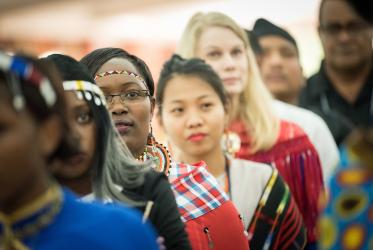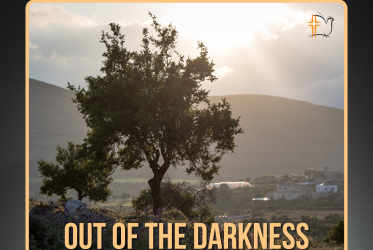Dealing with people on the move is crucial to the work of the Church in the 21st century says Greek Metropolitan Gabriel of Nea Ionia and Filadelfia. More than 31,000 irregular migrants arrived in Greece by sea in 2018 and almost 17,000 arrived by land, according to the UN’s International Organization for Migration (IOM). That was more than the previous year, and it stretched Greece’s resources while it was still reeling from economic turmoil. Metropolitan Gabriel, a member of the World Council of Churches Central Committee, spoke to WCC Communications about the refugee crisis. He has more than 18 years in the ecumenical movement and international affairs and said he was focussed on the task ahead for the WCC after the conference on “Xenophobia, racism, and populist nationalism” in Rome from 18-20 September. Metropolitan Gabriel described his participation in the WCC governing bodies as a unique opportunity to work for Christian unity and the work of churches for migrants and refugees.
Q: In recent years we have followed stories on masses of people on the move arriving in Greece and hosted in refugee camps. How is it currently for migrants and refugees?
Metropolitan Gabriel: Things are very delicate right now in Greece. For the last eight years, we have lived in a dire economy amidst the tragedy of so many people losing their jobs resulting in shedding more than 30 per cent of our GDP. At the same time, we have had to face the new challenge of so many migrants and refugees arriving who wanted to pass to Europe through the Greek borders. For the last 25 years, we had witnessed economic migrants coming to seek a better future, but increasingly in the last five years, they have been fleeing the war in Syria and conflicts in the sub-Saharan countries of Africa.
Q. How has this newly formatted challenge been dealt with?
We are currently at a loss as to how to deal with this unprecedented situation. Vast numbers of asylum seekers are now blocked, due to the Dublin II treaty, and the refugee camps facilities cannot host them properly. Diseases and inner conflicts are a daily reality in the camps, and we are all aware of the tragedy in the island of Lesvos and the Moria camp. The government is trying to do its best, but the procedures are complicated, and we foresee a huge crisis coming.
We currently have so many new arrivals, and this will continue. The international agreements have not proved to be effective with no realistic positive outcomes. European political institutions, in cooperation with the UN Refugee Agency, UNHCR, need to work on a new effective policy or, in a very short time, we will face huge problems of stability and peaceful co-existence in Greek society. You can understand that for the last five or six years these situations presented significant challenges to the Greek people, and they have proved their Christian faith and solidarity in praxis and in every possible way. But now they have begun to tire. Global society needs to understand that Greece now needs help and assistance to sustain herself.
Q: What actions have helped the refugees? How has the Church been involved?
Metropolitan Gabriel: Funding, of course, has been provided through the political agreements but money for me, and from the church point of view, is not the solution if you don’t have the facilities to serve the people and most importantly if you are not able to give them hope and a vision. There is also the very significant question of integration. The process of receiving migrants and people from war conflict situations in one thing. But how you will integrate them into the European context is the real challenge. If we will have such a significant number of people, how can we provide them with a dignified way of life, teach them several languages and European history? If we are not able to reach a positive social outcome through integration, then we face a new crisis of stability and social cohesion at every local in society. In that sense, nobody knows what the future will bring.
Q: We have the symbolic power of visits from the Ecumenical Patriarch Bartholomew and Pope Francis to refugee camps. Do you believe that church leaders at this level can help others connect with justice and peace?
Metropolitan Gabriel: Such visits and symbolic gestures of peace engage the global community to have the needed awareness. By signing a joint declaration, they appealed to society worldwide and especially to the UN organizations that have the experience and power to find the necessary solutions. The European institutions and member states or churches alone do not have the power or means to find answers, we need more facilities, more experience in crisis management and we need as many experts as possible to be engaged. So, having three church leaders, the Ecumenical Patriarch, the Pope and the Archbishop of Greece in the island of Lesvos showed global society the size of the problem. Mapping the refugee crisis at this stage is not enough. No words are needed, we need to have actions.
Q: You have long experience in international affairs, working with the European Commission. We currently see religion everywhere on the global agenda. A vast range of political leaders seeks cooperation with religious leaders and communities to help resolve world issues more holistically. Do you believe that the churches are ready to understand and accept this cooperation at all levels?
Metropolitan Gabriel: Any member of an Orthodox church knows very well the spiritual power we possess. Also, this is one of the highest contributions we can make to the world today: the power of spirituality. Any holistic, or integral, approach is a spiritual approach. We are at a critical point in which we need to raise our voices about the necessity of global cooperation in stability, peace, solidarity, and for virtues and values that are necessary if we want to have continuity in our societies. The stranger is an opportunity to see God.









